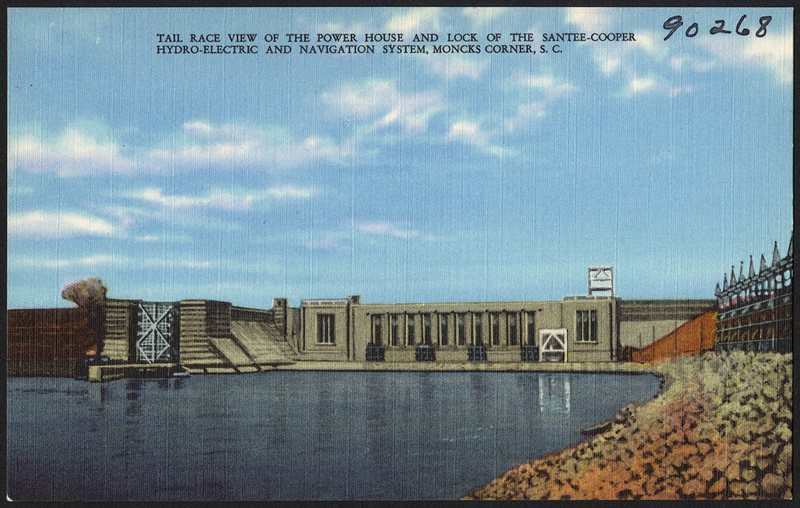
By Lindsay Street, Statehouse correspondent | There’s a sudden, fervent push to sell one of the nation’s few remaining public utilities that has roots in the early 20th century’s push to bring electricity to rural parts of South Carolina.
But exactly how the sale of state-owned Santee Cooper would happen is still up for debate in Columbia.
 Though the utility has survived previous efforts seeking to privatize the sprawling entity that does everything from electricity generation to managing mosquitoes near two public lakes, this push has support from the governor and key lawmakers.
Though the utility has survived previous efforts seeking to privatize the sprawling entity that does everything from electricity generation to managing mosquitoes near two public lakes, this push has support from the governor and key lawmakers.
The recent effort stems from Santee Cooper’s minority ownership role in a nuclear expansion project in Fairfield County that incurred more than $9 billion in debt before shuttering. Santee Cooper first pulled out of the deal, followed by for-profit SCANA, which became takeover candy for Virginia’s Dominion Energy. Since the nuclear debacle, state lawmakers have claimed Santee Cooper was mismanaged. Executives for the utility added fuel to the fire this week amid reports of hundreds of thousands of dollars of bonuses to executives. Those who oppose selling Santee Cooper say the utility is cleaning up its act. But it could all be too late.
In the House and Senate, resolutions are making their way to the floors that pave the way for its sale. The General Assembly must authorize a sale by law. Both resolutions give the final authorization to the General Assembly, but they differ in who evaluates bids. The House version seeks to have bids evaluated by a nine-member joint commission, while the Senate version seeks to have bids evaluated by the Department of Administration.

“Both bodies are saying, ‘Sell Santee Cooper,’” Charleston Republican Sen. Paul Campbell said Thursday. Campbell serves on the Senate Finance Committee, which weighed and gave a favorable report to a resolution this week.
Either resolution could get floor approval as next week, and then would need approval from the other body and the governor. But even with moving quickly on a resolution, the eventual sale or restructuring of the utility would take months.
“We still have a long way to go before the final offers are to us,” House Ways and Means Chair Murrell Smith, R-Sumter, said Tuesday.
That means any sale would need to get General Assembly approval in a special session while it is in recess, something that can be accomplished via a two-thirds majority, end-of-session vote, Campbell said.
- Previous coverage: Selling Santee Cooper is complicated. Read here to learn why.
In the Senate
Senate Bill 678 was introduced March 20 by Senate President Harvey Peeler, R-Cherokee, and has gained the support of Senate Finance Chair Hugh Leatherman, R-Florence. At first, the resolution raised eyebrows because it authorized the utility’s sale through the governor’s office. After an amendment this week, the sale would be evaluated and authorized by the cabinet-level Department of Administration. The sale would still require General Assembly approval, Campbell said.
“(It says) go find us a buyer for Santee Cooper and, if we get the right bid, we will agree to sell it,” Campbell said.

Berkeley County Republican Sen. Larry Grooms has been the most vocal against the resolution. This week, he expressed concerns about giving up General Assembly control of the sale, and a sale’s impact to his district, which is home to the utility. He announced a town hall meeting to discuss Santee Cooper legislation would be held 6 p.m. April 1 at Berkeley High School in Moncks Corner.
Grooms said the rushed push to get the Senate to adopt the plan for a sale might conflict with the Senate’s job to pass a budget.
“This is ‘stay tuned,’” he told Statehouse Report. “It’s going to unfold over the next six weeks.”
Campbell added the House is likely to also introduce a resolution that would mirror the Senate resolution. But so far, the House leadership appears in favor of keeping bid evaluations in lawmakers’ hands.
In the House
Smith said Tuesday the House is responding to the effort in the Senate by offering a resolution that keeps the sale and bidding decision in the hands of lawmakers.

“We needed to move forward with the resolution … through the force of law here,” Smith said in the meeting this week.
House Bill 4287 received favorable report Wednesday and will advance to the House floor next week. The resolution authorizes the current study committee to receive and approve sale and management offers. The bids will be evaluated through keeping rates low or lowering them, protections for the lakes the utility manages, and protection for employees, Smith said. He added that no decision has been made the sell the utility, and that it could ultimately remain a public entity, though reformed.
Last week, House Speaker Jay Lucas, R-Hartsville, who is a proponent of selling Santee Cooper, urged the Senate to adopt the House’s plan.
“We have introduced a thoughtful, workable roadmap to pursue possible sale or other methods to protect ratepayers. I am pleased that President Peeler has recognized that the time has come to sell Santee Cooper — now we also have the way. We urge the Senate to adopt this Joint Resolution.”
One other possibility
If a House- or Senate-backed measure to sell Santee Cooper runs into interference from the efforts to pass the Senate’s version of the budget, Grooms said there was a possibility that House budget conferees in late April or May could add language into the budget for the sale. Senate rules, he said, prohibit changes of permanent law to be included in the budget.
- Have a comment? Send to: feedback@statehousereport.com















 We Can Do Better, South Carolina!
We Can Do Better, South Carolina!
No IOU will be able to keep rates as low as Santee Cooper, even after Santee Coopers rate increase.